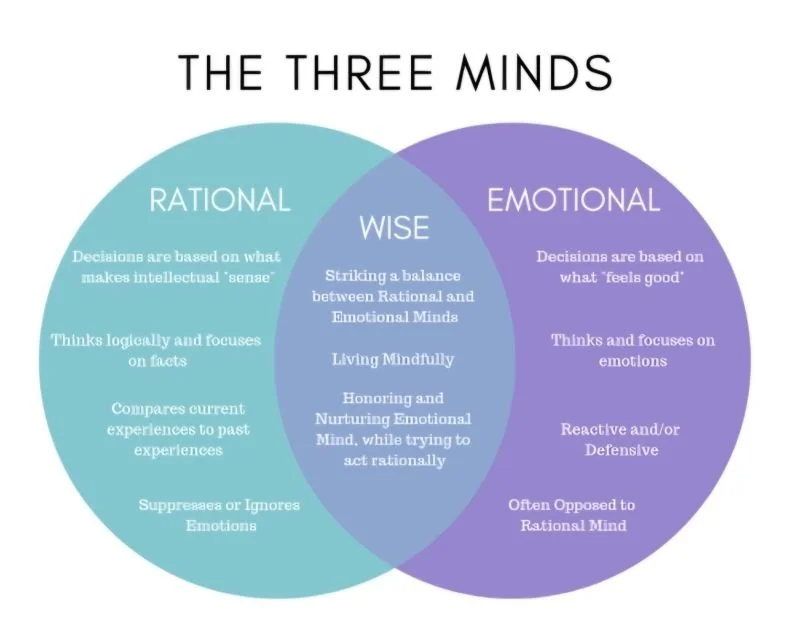Finding Your Balance: How to Use Wise Mind in Everyday Life
Have you ever noticed how some decisions feel like they’re coming from a storm of emotion, while others feel cold and overly logical? It can be hard to know which part of you to trust—especially when you’re overwhelmed, stressed, or navigating something tricky in a relationship or parenting moment.
This is where Wise Mind comes in.
What Is Wise Mind?
In Dialectical Behaviour Therapy (DBT), Wise Mind is the balanced space between two mental states:
🧠 Rational Mind (facts, problem-solving, logic)
💛 Emotional Mind (feelings, urges, intuition)
Wise Mind is where both can coexist. It’s the calm, clear part of us that knows when to pause, when to feel, and when to act. It’s not about ignoring emotions or overriding logic—it’s about integrating both to respond thoughtfully, not reactively.
Think of it as the part of you that can hold space for big feelings and still decide what matters most in that moment.
Why It Matters
When we live mostly in Emotion Mind, we might act impulsively or feel out of control. When we stay stuck in Rational Mind, we can come off distant or disconnected—from ourselves and others. Wise Mind helps us respond from a place of clarity, self-respect, and alignment with our values.
It’s especially helpful in parenting, relationships, or moments where emotions are high. Taking that breath to drop into Wise Mind can be the difference between a conversation that deepens connection and one that ends in regret.
How to Find Your Wise Mind
This isn’t about getting it perfect—it’s about creating space for awareness and choice. Here are a few gentle steps to help you tune in:
Pause and notice: Ask yourself, “Am I in Emotion Mind, Rational Mind, or somewhere in between?”
Take a few deep breaths: Even just 30 seconds can help you shift out of reactivity.
Check in with your values: What matters most to you in this moment? What would you like to model—for yourself or others?
Act from that place: Wise Mind responses are often slower, softer, and more intentional.
What the Research Says: Wise Mind, Meet Brain Science
Wise Mind isn’t just a lovely concept—it’s backed by some pretty solid neuroscience. When we practise mindfulness (which Wise Mind relies on), we’re actually giving our brain a little workout. Over time, this helps us respond rather than react—especially when emotions feel like they’re in the driver’s seat, speeding through red lights.
Mindfulness practices—like noticing and naming what we’re feeling—activate the prefrontal cortex, the part of your brain responsible for planning, reasoning, and decision-making (Siegel, 2007; Hölzel et al., 2011). Meanwhile, mindfulness also helps turn down the volume on your amygdala, the brain’s emotional alarm system. This means fewer knee-jerk reactions, less emotional whiplash, and more space to pause and respond (Taren et al., 2015). Over time, regular mindfulness practice is associated with reduced emotional reactivity and greater emotional resilience (Linehan, 1993; Tang et al., 2015).
When It’s Hard to Find Wise Mind
Let’s be real: accessing Wise Mind in the heat of the moment can feel like trying to find your keys when you’re running late. It’s frustrating, it’s messy, and it sometimes feels impossible. You know that split-second when your emotions take over and all you can think is "I’m about to snap!" or "I’m going to say something I’ll regret!"? Yeah, that’s Emotion Mind doing its thing, and it’s powerful.
The truth is, Wise Mind doesn’t always show up right away. When you’re in the middle of a tough conversation, feeling overwhelmed, or caught in a swirl of negative thoughts, it’s totally normal for Reasonable Mind or Emotion Mind to take the wheel. It’s like your brain’s autopilot kicking in, and even though we want to be grounded and calm, sometimes we need a minute (or 10) to hit reset.
Here’s the good news: Wise Mind is always there—but it may not appear the moment you need it. And that’s okay. The key is to give yourself permission to pause, breathe, and reconnect. Maybe it shows up 10 minutes later when you’ve had time to process, or even after a good night's sleep. Sometimes, taking a step back and allowing your emotions to settle gives you the space to access your Wise Mind in a more thoughtful and grounded way.
Gentle Encouragement: If you find yourself reacting impulsively, rather than perfectly practicing Wise Mind, don’t be too hard on yourself. Life’s messy, and this work is all about progress, not perfection. The more you practice, the easier it will get to notice when your emotions are starting to take over, and the quicker you can bring yourself back to a calm, centered place.
Remember: Wise Mind doesn’t judge—it simply invites you to listen to both your heart and your head, and find the middle ground. Sometimes, that’s all we can do—and it’s enough.
